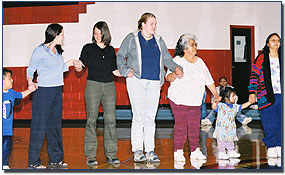
Tribes hold tot he way of their ancestors
American movies help perpetuate European stereotypes
Changing 's-word' controversial but needed to make a difference
| by Kathrin Podbrecnik Europeans always have a clear picture of what things they have never seen before will be like. Therefore, I knew that the reservations we would visit in southern Idaho would be located in the middle of the forest, fenced in and hidden from the world. So you can imagine my surprise when we got there: there was open, dry land, mountains and no fences to be found.
|
After the days we had spent at the reservations, I realized that generosity and hospitality are the characteristic features of Native Americans: the tribe in Duck Valley organized a powwow especially for us and we even got beautiful beadwork and T-shirts from tribal members at Fort Hall. Listening to the impressive Native American songs and the vivid legends that they shared with us helped me to imagine the strength of their culture and their faith. Now I understand that only a very powerful culture like the Native American one can survive oppression and expulsion. This and the strong bonds between tribal members enabled them to keep on fighting for their rights for several centuries. In Europe, some people consider aboriginal cultures as underdeveloped, but I think that Native Americansí close relationship to their environment is the correct way of life because they try to live in harmony with the things that surround them. I think that our European culture is sometimes so much developed that it starts to get underdeveloped, when one thinks of all our material or financial values and beliefs. When we returned to Boise, we suddenly realized that this city was built on aboriginal Native lands. I looked at all the skyscrapers, highways and cars and, once again, I felt completely ashamedÖ
|
||||||||
|
|||||||||
